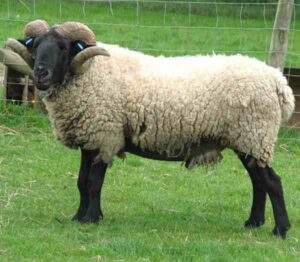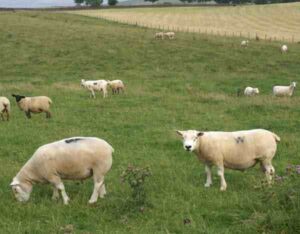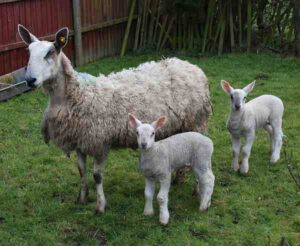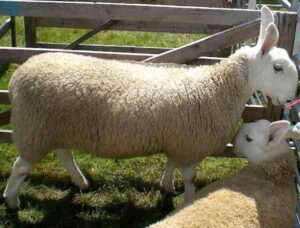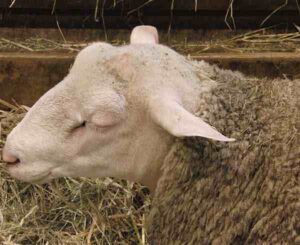The Polled Dorset sheep is a breed of domestic sheep from United States. It was actually developed for meat production at the North Carolina State University Small Ruminant Unit in 1956. A polled strain of Dorsets were also developed in Australia in the 1900s.
However, these were not as a result of a genetic mutation but resulted from the introduction of Corriedale and Ryeland blood into the Dorset Horn. As the name suggests, the breed is actually a polled or hornless variation of the Horned Dorset breed.
The breed is the result of a genetic mutation by which some of the offspring of a certain ram grew no horns. 4 hornless lambs were sired from a Horned Dorset on a farm at North Carolina State University in Raleigh in 1949.
And a strain of Dorset sheep was created after some years of breeding work, which had lost the characteristic horns and which bred true.
After research and testing were done to confirm that the Polled Dorset carried the same characteristics as the Horned Dorset and was able to pass on these traits.
In the year of 1898, the Continental Dorset Club formed, and the club registered the very first Polled Dorset sheep in 1956. Today the Polled Dorset sheep is very popular in it’s native country.
And it is considered to be the 2nd most popular breed of sheep in the United States. Read some more information about this sheep breed below.
Polled Dorset Sheep Characteristics
The Polled Dorset sheep are a medium to large sized animal with an all-white coloration. Their carcass are muscular with good conformation and the mature animals produce a thick fleece.
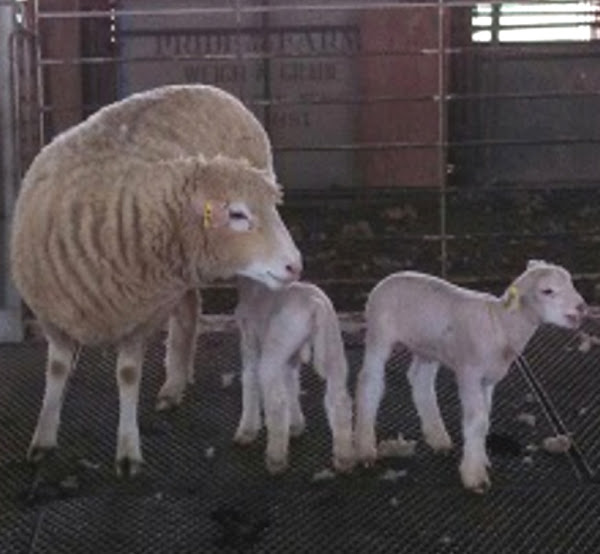
Their fleece is very white in color, strong, close and free from dark fiber and extends down the legs. Their fleece is free from dark fibers. And the fleece averages between 2.23 and 4 kg when shorn.
Average live body weight of the mature Polled Dorset rams is between 102 and 125 kg. And average live body weight of the mature ewes vary from 67 to 91 kg. [1]
Uses
The Polled Dorset sheep are a meat sheep breed. They are raised mainly for meat production.
Special Notes
Polled Dorset sheep are very hardy and strong animals. They are noted for their ability to breed more than once per year and are usually used in crossbreeding for producing females for out-of-season breeding.
And the ewes are highly prolific. They are one of the few sheep breeds that have this characteristic. The Polled Dorset sheep are very good for commercial sheep farming business, and they can also adapt themselves well to confinement.
Multiple births are common in them. They are even suitable for programs where rams are specifically used to sire lambs for slaughter.
These rams are known as terminal sires since their genetics are more suitable for slaughter than breeding purposes. They thrive under grass-based and feedlot conditions and are more suitable on small farms that are intensely managed.
Today the Polled Dorset sheep are very popular in the United States, and they have also spread to Canada.
And the breed has become a major contributor in the commercial lamb industry. However, review full breed profile of the Polled Dorset sheep breed below.
| Breed Name | Polled Dorset |
| Other Name | None |
| Breed Purpose | Mainly meat |
| Special Notes | Very hardy and strong animals, noted for their ability to breed more than once per year, usually used in crossbreeding, ewes are very prolific and are able to breed out of season, very good for commercial sheep farming business, can adapt themselves well to confinement, multiple births are common, can thrive under grass-based and feedlot conditions, most suitable on small farms, today the breed is one of the most popular sheep breeds in the United States |
| Breed Size | Medium to large |
| Weight | Rams weight between 102 and 105 kg, and mature ewe’s weight vary from 67 to 91 kg |
| Horns | No |
| Climate Tolerance | Native climates |
| Color | All-white |
| Rarity | Common |
| Country/Place of Origin | United States |

